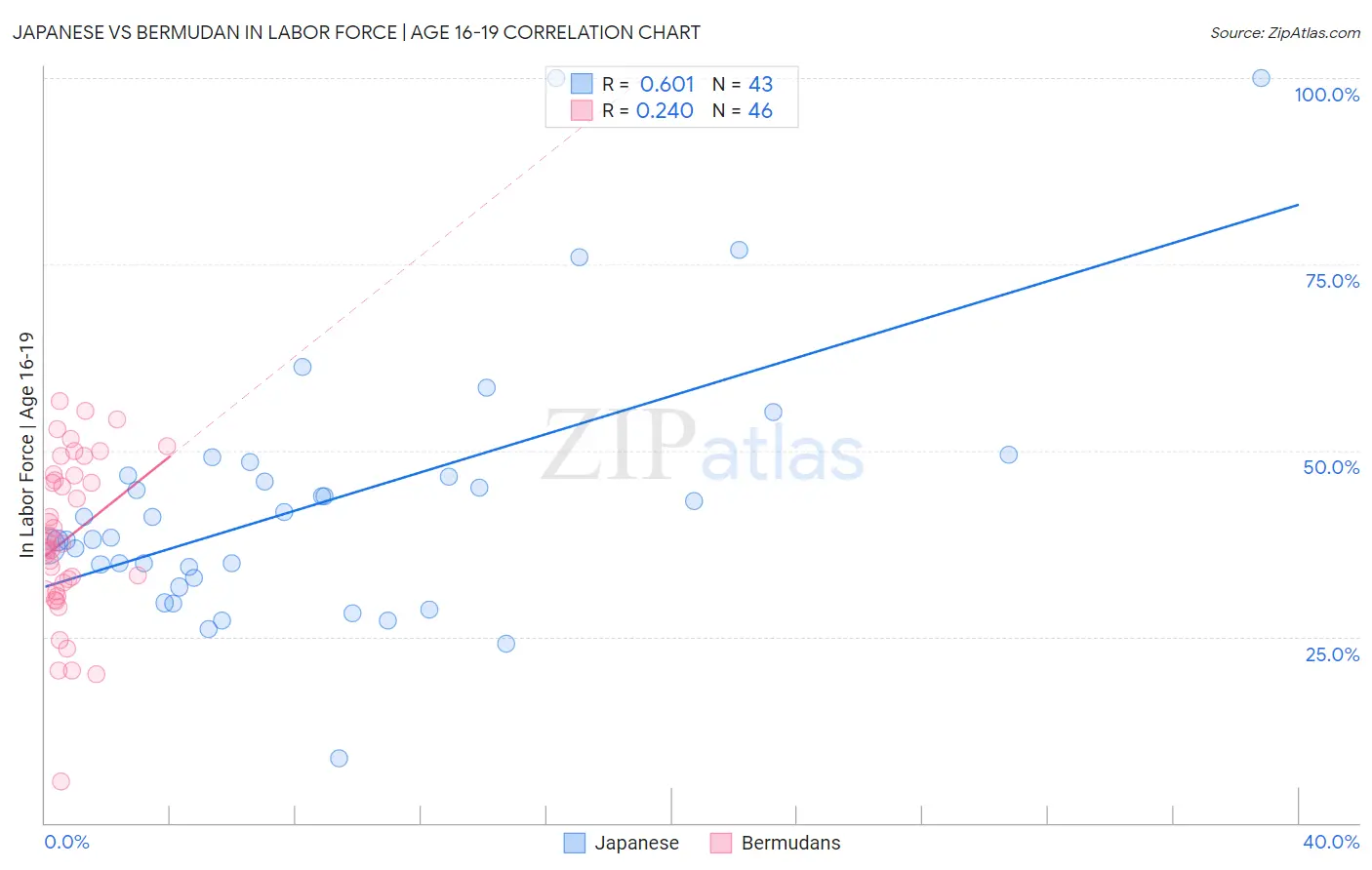Japanese vs Bermudan In Labor Force | Age 16-19
COMPARE
Japanese
Bermudan
In Labor Force | Age 16-19
In Labor Force | Age 16-19 Comparison
Japanese
Bermudans
37.5%
IN LABOR FORCE | AGE 16-19
89.3/ 100
METRIC RATING
144th/ 347
METRIC RANK
36.9%
IN LABOR FORCE | AGE 16-19
69.3/ 100
METRIC RATING
163rd/ 347
METRIC RANK
Japanese vs Bermudan In Labor Force | Age 16-19 Correlation Chart
The statistical analysis conducted on geographies consisting of 249,091,187 people shows a significant positive correlation between the proportion of Japanese and labor force participation rate among population between the ages 16 and 19 in the United States with a correlation coefficient (R) of 0.601 and weighted average of 37.5%. Similarly, the statistical analysis conducted on geographies consisting of 55,701,640 people shows a weak positive correlation between the proportion of Bermudans and labor force participation rate among population between the ages 16 and 19 in the United States with a correlation coefficient (R) of 0.240 and weighted average of 36.9%, a difference of 1.6%.

In Labor Force | Age 16-19 Correlation Summary
| Measurement | Japanese | Bermudan |
| Minimum | 8.6% | 5.6% |
| Maximum | 100.0% | 56.7% |
| Range | 91.4% | 51.1% |
| Mean | 43.1% | 38.2% |
| Median | 38.2% | 37.6% |
| Interquartile 25% (IQ1) | 32.8% | 31.2% |
| Interquartile 75% (IQ3) | 46.7% | 46.6% |
| Interquartile Range (IQR) | 13.8% | 15.4% |
| Standard Deviation (Sample) | 17.9% | 10.9% |
| Standard Deviation (Population) | 17.7% | 10.8% |
Demographics Similar to Japanese and Bermudans by In Labor Force | Age 16-19
In terms of in labor force | age 16-19, the demographic groups most similar to Japanese are Paiute (37.5%, a difference of 0.0%), Pakistani (37.6%, a difference of 0.020%), Immigrants from Western Europe (37.5%, a difference of 0.050%), Brazilian (37.5%, a difference of 0.080%), and Romanian (37.5%, a difference of 0.24%). Similarly, the demographic groups most similar to Bermudans are Immigrants from Jordan (36.9%, a difference of 0.010%), Cambodian (37.0%, a difference of 0.13%), Immigrants from Saudi Arabia (37.0%, a difference of 0.28%), Yaqui (37.1%, a difference of 0.32%), and Ute (37.1%, a difference of 0.40%).
| Demographics | Rating | Rank | In Labor Force | Age 16-19 |
| Pakistanis | 89.5 /100 | #143 | Excellent 37.6% |
| Japanese | 89.3 /100 | #144 | Excellent 37.5% |
| Paiute | 89.3 /100 | #145 | Excellent 37.5% |
| Immigrants | Western Europe | 88.9 /100 | #146 | Excellent 37.5% |
| Brazilians | 88.7 /100 | #147 | Excellent 37.5% |
| Romanians | 87.3 /100 | #148 | Excellent 37.5% |
| Native Hawaiians | 85.0 /100 | #149 | Excellent 37.4% |
| Tsimshian | 84.7 /100 | #150 | Excellent 37.4% |
| Immigrants | Poland | 84.4 /100 | #151 | Excellent 37.3% |
| Immigrants | Sierra Leone | 83.6 /100 | #152 | Excellent 37.3% |
| Arapaho | 81.8 /100 | #153 | Excellent 37.3% |
| Immigrants | Bulgaria | 81.6 /100 | #154 | Excellent 37.3% |
| Immigrants | Lithuania | 80.7 /100 | #155 | Excellent 37.2% |
| Kiowa | 80.4 /100 | #156 | Excellent 37.2% |
| Immigrants | Brazil | 76.5 /100 | #157 | Good 37.1% |
| Ute | 75.7 /100 | #158 | Good 37.1% |
| Yaqui | 74.4 /100 | #159 | Good 37.1% |
| Immigrants | Saudi Arabia | 73.9 /100 | #160 | Good 37.0% |
| Cambodians | 71.5 /100 | #161 | Good 37.0% |
| Immigrants | Jordan | 69.5 /100 | #162 | Good 36.9% |
| Bermudans | 69.3 /100 | #163 | Good 36.9% |